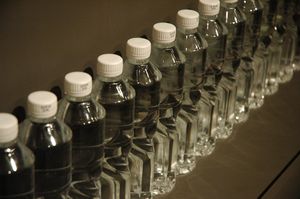I won’t pretend this isn’t an opinion piece, but it is an opinion piece with a purpose. Its purpose is to reason out the logic or lack thereof of buying drinking water sold in bottles. It is an article that identifies some of the pros and cons of purchasing your water in plastic bottles. Disclaimer: Please note that I don’t have any political or other agenda in mind, whereas the resources I list may. I merely list them for informational purposes.
Alternatives Often Less Desirable
Probably the majority of persons who would eat “on the road” would buy soda to drink. Probably that soda was most often a cola beverage, containing sugar, phosphoric acid, and caffeine. Another possibility would be buying coffee or tea. Both of those contain caffeine, and generally are served with sugar, and possibly cream or milk. Americans in particular are already notoriously overweight as a people, and don’t need sugar or additional fat. Caffeine is not bad in reasonable quantities, but neither does it serve as a useful nutrient. Since bottled water is available, many persons are opting to buy a bottle of water, rather than soda or a hot beverage.
Water – Hydration and Body Chemistry
Water is necessary to maintain hydration and good body chemistry, and so there is no better beverage. It flushes the kidneys, which are often overtaxed, partly because of the high level of meat in the American diet, and partly because we gradually learn to neglect the urge to drink if we are not careful. Soda, although it contains water, does not bring about the desired level of hydration our body needs, and coffee is a diuretic. So, water bought in bottles is the better choice.
Economics
Many brands of bottled water are truly outrageously priced. If one is willing to pay high prices for simple water, companies take note. Their observations drive the prices of other beverages upward-it’s a matter of economics. Much like butter a number of decades ago-which was not too expensive-when margarine came along, the price of butter went up. Although its price rise has slowed, it didn’t take long after oleomargarine (now called margarine) became popular for supposed health reasons, that it jumped to $2.00 a pound. Again, it’s a matter of economics.
Purity
What about purity? Water from most household taps must meet certain drinking standards established by local governments. It thus is usually safe to drink, and extremely inexpensive. Water from the tap is a bargain, in fact. So is water purchased in bottles healthier? It could be-but no, not necessarily. Consider what the source is. Is it to be imagined that companies travel up into the frozen mountains seeking some fancy spring that bubbles forth virgin water? If anyone thinks that, he needs to come back to earth and get a clue. Let’s face it. We don’t know what the source is. It could be city water from an ordinary tap, perhaps filtered or treated. In other words, it could be worse than the water you would draw from your own home tap.
The Bottle
Plastic is generally made with compounds to adjust its properties called “plasticizers.” Can traces of compound leach out from the plastic into the water we consume? Of course it can. And what if the bottles at some point happen to sit in the sunlight or get hot? Such plasticizers could all-the-more readily leach out into the water. What about the plastic bottles adding waste to an already burgeoning municipal problem? Recycling? Sometimes, yes. Realistically, much of the time, no.
Additives
Also, were you aware that many purveyors put salts into the water you drink? Perhaps gypsum or some other salt, even table salt is in the water you buy, although naturally it is in small quantities. It will be claimed it makes the water taste better. Perhaps it even does. But could it also be those salts make us thirstier, and more likely feel thirsty sooner, possibly bringing greater profits to the manufacture. I’ll let you decide for yourself about that.
In Conclusion
Should you be in favor of bottled drinking water? Well, that’s up to you. If you’ve read this article, you know what I think about it. If you do prefer water, why not take your own from home as a cost-saving alternative and one that allows you to know what you are drinking? It’s up to you.
Resources:
MNN – 5 reasons not to drink bottled water
Bottled Water Quality Investigation: 10 Major Brands, 38 Pollutants
